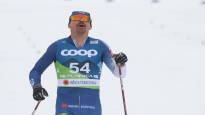The manager of the star skiers wants a clear text in the new athlete contract on how, for example, responsibilities are divided if the athlete is caught in a fluoride cream test through no fault of their own.
When the start of the international competition season in Kuusamo’s Ruka is three and a half weeks away, the Finnish Ski Federation and the national teams under it are in a familiar situation.
The athlete contract for the upcoming season, which records the responsibilities and rights of the umbrella organization and the athletes, is still being prepared. It can be signed at the earliest during the national team camp before the World Cup.
As one of the important creditors of the national team skiers, the contract is being negotiated this year as well Krista Pärmäkoski and Niko Anttolan manager Aki Pajunoja.
Pajunoja, trained as a tough contract negotiator in the corporate world, told Urheilu on Monday that preliminary contract drafts have been moved between the federation and the athletes. However, according to the Manager, one aspect has been completely missing from them, which may have a very strong impact on top international skiing in the coming years: the total ban on fluoride cream for this season in the World Cup and for next year also in the value competitions.
Difficult to apply
– From the drafts so far, the fluoride issue has been conspicuous by its absence. I am trying hard to make sure that it is included in the agreement in some form, because it can be very difficult to apply the current clauses of the agreement to this new rule with all the lenient aspects, Pajunoja said.
Many national team skiers have admitted that the new situation is confusing on some level.
There is a lot of uncertainty among people about, for example, the reliability and fairness of monitoring technology, and about the situations in which an amount of fluoride that exceeds the limit values can end up on skis, so that the athlete has no part or chance.
The first victim came over the weekend, when a Norwegian alpine skier by Ragnhild Mowinckel the giant slalom performance at the World Cup was rejected due to the discovery of fluoride cream.
Aki Pajunoja reminds that, unlike in chemical doping, when it comes to fluoride creams, things can go badly for an athlete without having anything to do with it. A top skier’s skis are always lubricated in the World Cup for race condition by the maintenance team; the task of the athlete is to test and choose the skis. The financial loss can be very large, on top of which comes reputational damage.
– In case of such unfortunate situations, it would be of the utmost importance that the challenges of the fluoride cream ban be included at some level in the text of the athletes’ contract. I don’t doubt the ethics of the maintenance team, but bad things can happen for so many reasons beyond the athlete’s control: the causes can be the cleanliness of the maintenance truck, someone’s gloves or other accessories, the skills of the maintenance man, the ski factory or the International Ski Federation’s monitoring device, Pajunoja states.
– Because of this, of course, it is also very difficult to point the responsibility where it belongs in different situations.
Not under the bus
The manager hopes that the public would not throw the athlete under the bus in such situations, so to speak, and that the start ban or rejection of the performance caused by the discovery of flue oil would in no way be equated with doping violations.
Three-time Olympic champion, training outside the national team until the start of the World Cup Iivo Niskanen told Urheilu that he hasn’t lost sleep at night because of the new situation. He trusts the competitiveness of his own cream manufacturer’s fluorine-free products.
– The situation becomes commonplace during the season. I believe that by the beginning of 2024, we will already be talking about other things around skiing. I see this ban as the end point of an inexorable development.
If a bad scenario were to materialize, Niskas has no ambiguity about who will pay for the situation with their wallet and reputation.
– After all, it (rejection caused by fluoride creams) is the athlete’s responsibility, the operating model is clear to that extent. But you have to remember that even up until now, the ski pair itself has accounted for 80 percent, grinding 15 percent, and lubrication five percent of the result. It is also good to put this into perspective, Niskanen, who is camping in Muonio, reminded.
Worry is a good word
His long-time national team mate Perttu Hyvärinen currently practices in Sotkamo’s Vuokatti. He is not as calm as Niskanen.
– Worry is a good word to describe the situation. Everything is so speculative and it feels like there is very little definite information.
Without a doubt, Hyvärinen would like a ban on fluoride cream to be included in the new athletes’ agreement at some level.
– This should also be clear before we go skiing.
On request, Hyvärinen also formulated the worst scenario he could imagine.
– Let’s think that you have skied a good Tour de Ski and you have achieved good prize money and are getting more from the overall competition. And then in the sixth race, rejection and out of the whole Tour, loss of tens of thousands of euros. That would be a really drastic situation. Really rough.
